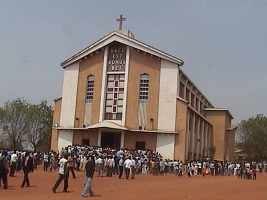Abyei citizens want referendum to go ahead despite Sudan’s rejection
September 10, 2013 (JUBA) – Representatives from various civil society and faith-based organisations from the contested Abyei region took to the street on Tuesday to protest the failure of Sudan and South Sudan to agree on a date for a proposed referendum, warning that they would decide their own destiny if the two sides continued to stall.

Deng Ajing Mijak, a member of Abyei youth council, said the protest was held to send a clear message to the international community and the two leaders on the necessity of holding a vote on whether the oil-producing region should be returned to South Sudan or remain a part of Sudan.
“The whole idea was to send out clear and simple message to the international community so that they should not only put pressure on the parties, especially Khartoum, but demonstrate their willingness to stand with the people of Abyei. We need them to act”, Mijak told Sudan Tribune on Tuesday by phone.
General Mario Kuol Monyluak, a senior member of the governing Sudan People’s Liberation Movement (SPLM) in the area, said the people of Abyei would not accept any further delays on the conduct of the referendum.
“The issue of [the] referendum is now becoming a red line for the people of Abyei. It is the only issue in their minds and delaying it again would not be justifiable. It has now come at a time [when] our people do not listen to us anymore because there is nothing we have not told them”, said Kuol, adding that the demonstration was peaceful and passed without incident.
“It was staged to send out a message calling for international support, especially putting enough pressure on the two leaders to hold [an] immediate summit so that they can agree on the date for the conduct of the referendum”, he said.
Presidents Bashir and Kiir agreed in a meeting held last week in Khartoum to fully cooperate to implement the cooperation agreements of 27 September 2012 aiming to normalise bilateral relations between the two neighbouring countries.
However, they avoided to discuss Abyei referendum, as Khartoum insists on the formation of Abyei temporary institutions while South Sudanese officials from the disputed region refuse such step arguing that in line with decision of International Arbitration Tribunal, only the nine chiefdoms of the Dinka Ngok have the right to administrate their land.
In Juba, the Abyei Joint Oversight Committee (AJOC) held a press conference calling on the African Union (AU) to apply more pressure on the two leaders to come to an agreement, warning the vote would go ahead despite Sudan’s rejection of the proposal.
“There is nothing which will stop the people of Abyei from determining their fate. I would only appeal to all our people to maintain peace and do not trust or listen to lies coming out from Khartoum”, AJOC co-chair Edward Lino said in comments broadcast by the state-owned South Sudan Television (SSTV) on Tuesday.
“The future of the people of Abyei is in their hands. It is not with Khartoum. We have nothing to do them anymore”, he added.
In Khartoum, Sudanese officials refuse any attempt to hold an unilateral vote. Sudan’s AJOC co-chair, Al-Khair Al-Faheem, has warned that any arrangements undertaken to hold a referendum independently would constitute an illegal act.
Last year, the African mediation led by Thabo Mbeki team proposed that a referendum be held in Abyei this October where only the Dinka Ngok and few Misseriya settled in the area will vote, but Khartoum rejected the proposal which is seen as supportive to position of the South Sudanese government.
This proposal would effectively bar the Arab Misseriya nomads, who enter Abyei periodically to graze their cattle, from taking part in the plebiscite, meaning the majority of voters would come from the South-aligned Dinka Ngok tribe.
(ST)
